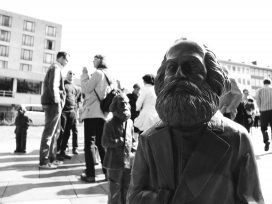Almantas Samalavicius: The contemporary intellectual climate can be described in various ways: some interpret it as a form of undeclared war on religion. It would be difficult to find any other period in human history, especially in western civilization, where religions are seen as a Pandora’s box of all possible evils, even though the greatest thinkers have always reminded us that we should and could view them as sources of wisdom. Leaving aside the issue of religion as an organized institution, I would like to start out by asking whether Christianity still provides any deeper insights into the problems of the contemporary world? Can we learn something from the wisdom of Christian thought?
Norman Lillegard: It is clear that hostility towards religion has become more widespread in recent years. There is, indeed, a dark side to the histories of most religions, and at the beginning of the twenty-first century there have been some dramatic instances of religiously inspired violence and murder, so negative attitudes towards religion have some justification. But my impression is that the negative attitudes mostly precede any appreciation of the evidence that might support those attitudes. It has simply become widely fashionable to trash religious belief and Christianity in particular. For example, I had a quite intelligent student who claimed with confidence that the mediaeval cathedrals had been built by slave labour. I don’t know where he picked up such nonsense, but certainly his ready acceptance of it has to do with a general atmosphere, a tendency to accept nearly anything, no matter how ridiculous, that seems to discredit religious belief, and a general ignorance of, or scepticism towards, whatever might count in its favour.
It is not so easy, however, to present a case for the value of religious belief. Part of the reason is that the religions don’t simply propose items to believe; rather they propose a re-evaluation of all values, a way of thinking about what is valuable that may seem like nonsense to secular minds. Christianity, for instance, proposes that the way to wholeness is the way of suffering: that the first shall be last, that (to echo Heraclitus) the way up is the way down, that the poor shall inherit the earth, that life comes through a kind of death, that life is fragile and ultimately escapes the grasp of the strongest, most anxious striving, and so must be submitted to the will of God and so forth. That may sound like nonsense to someone who values security and power and is wedded to a system that elevates pleonexia (“the accursed love of having”, as George Berkeley put it), that ignores or tries to defy mortality, that seeks to secure life through more and more invasive technologies, and that medicalizes every kind of human unhappiness or failure.

I suspect that the primary (though seldom acknowledged) reasons for the discounting or defaming of religion lie in these things rather than in epistemological difficulties, the ascendancy of “science” (in a vague sense), or a new multicultural “sophistication”. However, a not insignificant number of secular people recognize, to some degree, the degenerating effects of pleonexia and commodification, deplore the “therapeutic invasion” (cf. the career of Philip Rieff), medicalization, etc. For those people, some religious teachings, properly presented, could begin to appear to be, and could become, a source of wisdom for the conduct of life. The problem is to find someone who can and will properly present the core teachings. A widely discussed recent book by New York Times columnist Ross Douthat examines the “bad religion” espoused by both the religious right and the left, one represented by those TV evangelists who typically appeal to “the love of having”, the other by the liberal Christianity of old, mainstream denominations in the USA, where you can find some resistance to the consumer culture but none at all to the therapeutic invasion and the anomie that comes with it.
AS: People (I don’t have in mind those who are interested in philosophy because of their academic profession) sometimes think that philosophy can provide them with what religion in a secular society cannot. Many who believe themselves to be atheists or agnostics turn to philosophy hoping that it can provide answers to existential questions. What do you think of western philosophy’s potential to disseminate wisdom? Is western philosophy able to aid those disillusioned in the values of the booming consumer society and unlimited consumption, continuous progress and failing economic dogmas? Can philosophy help educate the mind that is open to alternative futures that are not based on consumption and the devastation of our environment?
NL: Most western philosophy, both Anglo-American and continental, does not aim at edification or the cultivation of wisdom. Anglo-American philosophy in particular is primarily devoted to detailed analysis of problems in epistemology, metaphysics and meta-ethics of a kind that is accessible to very few people. That is to be expected. An important part of the philosophical enterprise has always appealed only to highly sophisticated elites. For example, Plato’s Parmenides, Aristotle’s Metaphysics and Kant’s Critiques have never been, and are not now, accessible to very many people. On the other hand, there is a Socratic tradition that does seek for something like “wisdom” and edification. That tradition has never died out. Kierkegaard and perhaps Nietzsche in the nineteenth century, the existentialists in the twentieth and various twenty-first century figures are in that tradition in some way; today there are whole industries devoted to pondering, and sometimes recycling, Kierkegaard and Nietzsche. But in Anglo-American contexts all of that is still a minority affair, even though many of these figures have more appeal to people outside professional philosophy than does analytical philosophy.
So, the overall picture is not encouraging for those who hope to find life guidance or wisdom in philosophy. But there have been some interesting developments even in analytical philosophy in the past 30 years. The renewal of virtue ethics, new developments in epistemology and a kind of quasi-scholasticism that takes up many of the issues in religious doctrine that preoccupied mediaeval philosophers and theologians, have changed the face of philosophy in that period. It is not, I think, an exaggeration, to claim that there is in professional philosophy now some of the most rigorous and subtle argumentation focusing on religious belief to have come along since the thirteenth century. It is ironic that this should be happening at the same time that claims about the irrationality of religious belief have acquired such cachet. Unfortunately, these efforts by philosophers have not had much of an impact on theological education, especially in liberal protestant circles, and even less impact on most secular thinkers. I think it is safe to say that Christopher Hitchens, to take one example of the “new atheists”, never worked through the arguments of Alvin Plantinga, to mention one of the most prominent philosophers of religion in the past 30 years. Had he done so, Hitchens would have needed to do a lot of rewriting.
AS: Your academic activities are not exclusively related to the US or the West. You have recently been teaching in China, which has an ancient, profound philosophical tradition that seems to have survived despite the ascent and continued rule of communism. On the other hand, large parts of Asia gave themselves over to the western ideology of technological progress, patterns of consumption and a debilitating economy. Since China is going to be one of the largest players on the world stage in this century, what are its chances of pursuing its own philosophical traditions and ethics of life? Can Confucianism, Taoism and other sources of wisdom sustain their positions?
NL: I believe that Confucius continues to haunt Chinese culture. Some argue that it is the Confucian influence that explains why so many Chinese believe in “democracy” yet also accept an authoritarian regime. The Asian Barometer Survey showed that a high percentage of Chinese rate “democracy” very highly. Although many admit to having no understanding of what democracy is, a significant minority understand it in terms of Confucian minben, according to which a regime is legitimized by the effect of its policies on the people, not the process by which it comes to power. The people are what count. As long as an authoritarian regime works for the good of the people – and we can argue about how well the Chinese regime does that – it will be compatible with “democracy” understood in this Confucian fashion. In a different vein, Confucius believed that an indispensable ingredient in mental training was the study of music, and it is arguable that the great revival of western classical music in China, the deliberate government policies that support musical training and the high premium placed on musical skill by university admissions procedures, all relate to that Confucian tradition. There is a “discipline” aspect to this that I think would be meaningless to most westerners. Westerners may understand the need for discipline in sports training, but very few of us understand the kind of disciplined intellectual and moral cultivation of self that Confucius extolled. He seems to have thought that musical training was an important part of that cultivation. China and its associated civilizations may have an advantage here. It is really remarkable how this tradition, which reaches back 2500 years, has persisted. There is nothing quite comparable to it in the history of the West.
There is also a continuing legacy of Buddhism and Daoism, and there may be as many as 100 million Christians if we include “house churches”. Witness the revival of interest in Lin Yutang, who tried to maintain a place in Chinese social development for all these strains of thought and practice.
AS: Let’s get back to the western academic context. In recent decades there has been pressure on the teaching of the humanities. This is based on the assumption that the humanities are of no practical use. Some even claim that they are useless and nothing more that academic decoration in the present productive and consuming society. As a result, programmes in the humanities are shrinking. In as far as the US is setting the tone of higher education worldwide, are there any signs of hope that the humanities might take back their position, insofar as they are related to critical thinking, education in values, right living and the like?
NL: There doesn’t seem to be any consensus, in the US at least, on the role, the future and the optimal shape of college and university education. Obama claims that everyone should have a chance at a college education, while others think that there are already too many under-prepared and marginal students attempting college. At the same time, the advent of for-profit universities and online education has provoked some debate about the shape and goals of higher education. But my impression is that there really is very little deep reflection on the place of education in the lives of individuals and societies, comparable to, say, the ideas outlined in Cardinal Newman’s Idea of a University. I believe that this is clearly connected to the absence of any sense of education as the imparting of wisdom or any other virtue. More and more people think of universities as places for the acquisition of technical knowledge that will benefit them financially.
There are perhaps two forms of resistance to that idea. On the one hand there is a widespread use of humanities courses and some social science courses to inculcate a kind of sensitivity to race, class and gender issues, and a corresponding critique of the traditional canon in literature and the arts, a canon which is widely thought to be captive to sexism, classism and the like. This is in line with “educational” efforts outside the classroom that attempt to inculcate mostly leftwing value orientations, some of which, aimed at entering students as part of campus orientation, have given rise to successful lawsuits claiming violations of first amendment rights. There is some evidence that this first kind of “values education” has contributed to a decline in the popularity of the humanities and a decrease in cultural and historical knowledge.
On the other hand there are a few programmes at various universities that are devoted to re-appropriating the traditional canon in literature, history etc. This latter form of resistance is, in my judgment, much less “ideological” – and has never to my knowledge given rise to any lawsuits. In any case, these two forms of resistance, with the first being far and away the dominant, are generally quite opposed to each other; they embody rather different views of what a humanist education can and should be, of what its value is. So, once again, I would say that there is very little ground for optimism on the part of those who still want to think of university education as an entrance into a deep understanding of and appreciation for a cultural heritage and a certain kind of “humanizing” that can result. There is simply too much disagreement among those who teach the humanities, not to mention between them and those in the “scientific culture”, over the place and value of humanist education. But I think we have to keep on struggling with these issues. They are extremely important, partly for the reasons suggested by your questions.
AS: In recent decades, the intellectual and academic milieu has been taken over by various sorts of relativisms. Modern academic preachers insist that there are no true and universal values, everything is debatable; any pretensions towards any kind of universalism are treated with suspicion. The academic world took relativism to its heart. What do you think about its role in and around academia? Where are we heading? Or have we, perhaps, approached a point where we should reconsider these new dogmas of the mind?
NL: I take “relativism” to be a catch-all term for a set of related ideas, some of which, as you suggest, have been especially popular in academia in the past several decades. The idea that there are no permanent moral truths, or even that there is no “truth” at all, may go back at least as far as the Sophists of the fifth century BCE, and has been debated by philosophers for centuries. Over this period, variations on relativist themes, in the form of historicism, or social constructionism, or some other variety of “post-modern” thinking, have penetrated far into the academy. The humanities and the social sciences in particular have been widely impacted.
But there is also popular relativism, and it is very popular. One thing any professor can count on is that nearly every student he or she encounters will “know” that “it is all relative” or “you should never make moral judgments” or “it all depends on your (subjective) point of view”. Students seem to resent the suggestion that there might be standards in morals, politics, the arts, and sometimes even in the sciences, that apply to everyone.
Stanley Fish, a US literary scholar whom I would classify as a modern sophist, seems to think that these popular attitudes and beliefs are not anything to worry about since they do not, as he puts it, “travel”, meaning that the people who proclaim such views don’t follow through on the implications, but instead reason and argue about moral matters, at least when they feel put upon, in much the same manner as people who oppose relativism. That is true to an extent. Some of those who insist that “we cannot make moral judgments” are quick to condemn those they think guilty of racism, sexism etc. and, like anyone, they don’t accept being lied to. Moreover, there are very few self-proclaimed relativists who think that a society with slavery is just as good as one without it, or that the improved social status of women doesn’t amount to moral progress. But, of course, the very idea of moral progress is off the table for real relativists since it requires a standard that spans different ages and cultures. All of this might show that relativism doesn’t “travel” as Fish claims, or it might simply show that many people are incapable of, or not concerned with, elementary logical consistency.
Whichever it is, it is not harmless. One practical effect of this kind of popular relativism is acceptance of intellectual laziness; many people will not take the trouble to think hard about crucial matters of conduct and living. Why should they if “everyone has his or her own opinion” and each opinion is of equal value? Another practical effect is the tendency to replace real moral – and other kinds – of deliberation and self-evaluation with ideological rant. Many a modern student finds old ideas of moral self-evaluation quite strange and even offensive: since I am not supposed to judge others for being cowardly, rash, lazy, indifferent, feckless, greedy, etc., surely I should not judge myself either! To judge others would be intolerant, to judge myself would indicate low self-esteem! Intolerance, along with racism, sexism and homophobia, are the only vices that seem to matter, and, inconsistently of course, they are regarded as real – that is to say not relative – vices. And it seems that they are always vices that other people have. They are known to be vices by virtue of having been identified as such in contemporary currents of “thought” in the dominant social ideologies. There is a strong connection between conformism, plain thoughtlessness and currently fashionable relativisms.
Some years ago (1996) the physicist Alan Sokal published an article, written in “postmodern” style, on “Quantum Gravity”. Although the article was published in a well-regarded cultural studies journal, it turned out to be a hoax. Sokal had written a parody and it was not recognized as such by the journal’s distinguished editors. Subsequently, he revealed his motives: the disdain for serious and competent argument, and the substitution of ideology for reasoned pursuit of the truth, which in his view marked postmodern writing, had very bad political and social consequences. The old fashioned, classical, view was that power could be undermined by truth. Once you have learned from Foucault or Derrida that truth is simply an effect of power, you are done for if you belong to a besieged minority. I think that is exactly right, and it is perhaps the worst consequence of currently fashionable relativisms, one that Fish apparently fails to consider.
AS: For some years now various parts of the world have been overtaken by economic crisis. As observers of our social realities we also have views on the course of economic development. Why do you think the ideology of endless production and consumption is still valid despite the obvious ecological crisis? What do you think about the “ethics” of consumerism and unlimited consumption – or pure greed – of those who currently set the financial rules for our societies?
NL: This relates, of course, to our discussions earlier. Pleonexia is a vice; some people argue that we need this vice to keep the economy going. I don’t think that was the view of Adam Smith, by the way, but in any case the practical consequences of that vice are in the news every day now. It seems that very wealthy people want still more and will engage in criminal activity, or something very similar, in order to get it. Economists may not agree on the extent to which personal greed is at least a necessary condition for the current financial crises that are threatening national economies, but I would be surprised if it turned out that such personal failings were not a basic factor. For example, I have heard it argued that one factor in the collapse of the housing market was the desire on the part of many people to move up into more luxurious housing than they could really afford. Put that together with greedy realtors and greedy practices by large banks, and some very large institutions soon begin to totter.
So, widespread vice, pleonexia, may at least be a necessary condition for the economic crises of our time. But in most of the analyses I encounter that possibility is not mentioned. Perhaps doing so seems impolite, judgmental and too “subjective” as we discussed earlier.
Over-consumption of all sorts of goods and services is similar to overeating in some respects. Overeating eventually takes an obvious toll in ill health and other bad side effects. In the US, those health problems are contributing to unsustainable medical costs, so there are efforts underway to reshape people’s eating habits. If overconsumption in general should contribute to a decline in wellbeing – and I think it does – perhaps at some point there would be some kind of awakening, comparable to what is taking place with respect to overeating. I don’t expect it soon, although some of the effects of overconsumption, such as environmental degradation, are already quite obvious.
Economists seem not to agree on either the diagnosis or the cure for the current economic crises. I suppose philosophers and social critics might be able to contribute to the conversation on these matters. We need to think hard about the nature of human community, about what constitutes real well-being and about human relationships to the natural world. Some of your previous conversations have taken up those themes in an interesting way.
If you think about ethics in terms of right and wrong, duty and rules, it may be difficult to see how there could be any moral significance to the arts. But if you think of ethics primarily in terms of virtues and vices, then the moral domain will appear to be quite extensive and one may be able to discern a moral dimension in the arts. Novels, stories, drama, epic adventures, are themselves often studies in virtues and vices and can sometimes make readers more alert to the complex motivational structures of human activities and institutions. The more I understand about virtues and vices the more I am likely to understand myself and be able to change myself. Consider just a few adjectives for vices: reckless, cowardly, greedy, slothful, careless, vindictive, presumptuous, rude, calculating, hypocritical, lustful, self indulgent, brutal, cruel. A list like this could be extended for several pages. Literature can show us what these sorts of traits are like, how they relate to one another, how they function in failed lives. Terms like these are sometimes called “thick” ethical terms because they have a lot of descriptive content. Learning to use them in self-assessment is arguably an important part of growing up, of becoming morally mature. Literature can facilitate this, so there can even be moral uses for literature. But it would be a serious mistake to think that it gets that use by becoming “moralizing”. Literature’s relation to moral concern is much more subtle than that. Oscar Wilde remarked that it is no argument against a man’s prose that he is a murderer. Maybe not, but if a man is a fool he is not likely to produce literature of real worth, or so I would argue (and have argued). And I judge that most murderers are fools. So Wilde was wrong. But note that the concept “fool” and its opposite, wise one, as they come down to us from the ancients, are complex and tied to a wide understanding of all the virtues and vices.
It is not only literature that can have moral import. So can the other arts but in less obvious ways. You know that I have some interest in Albert Speer, Hitler’s architect. There has been some discussion of the relationship between Speer’s obvious moral failings and the character and quality of his work. Some claim that there is no relationship. If we substitute “architecture” for “prose” that could be called the “Wilde view”. Others think there is some very direct relationship. I find Speer’s own remarks about what he came to see as the defects in his designs and their connections to his non-professional life quite interesting. In the final analysis I think the most illuminating appraisal of, for example, the Zeppelinfeld will show how it belongs to an oeuvre that would not have come into existence if Speer had not given in to some of the vices, both subtle and gross, that were encouraged by, and even foundational for, the Third Reich.
One more example: I recently read an essay by Rosalind Hursthouse, a well-known US philosopher. She described how the viewing of works by Goya and Picasso had gradually effected a change in her thinking about the ethical permissibility of war. The arts can make vivid and concrete what otherwise tends to be viewed from the perspective of dull cliché. And that can, in turn, effect moral change, greater moral sensitivity. This is not the place for a long discussion of aesthetics and I am not suggesting that we should be grateful for rather blunt uses of the arts for moral instruction, such as may have been entertained by Tolstoy. Once more, I think the arts work on character in subtle ways that are usually not easy to track. But those who think that literature and drama, the visual arts, architecture and even music have no moral import, need to think again.







